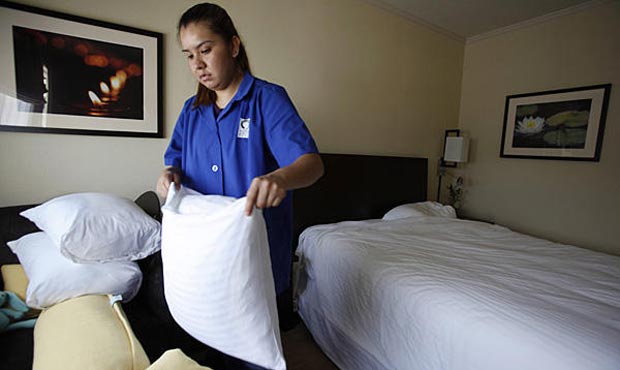Critics: Local unions avoid worker protections they advocate
Nov 17, 2016, 5:38 AM | Updated: 8:51 am

Backed by Washington’s most influential labor unions, recent measures to improve service industry working conditions have mandated better pay, scheduling and safety standards for thousands of service industry workers but with one notable exception: The mandates don’t apply to the unions that backed them. (AP/Paul Sakuma file photo)
(AP/Paul Sakuma file photo)
Backed by Washington’s most influential labor unions, recent measures to improve service industry working conditions have mandated better pay, scheduling and safety standards for thousands of service industry workers but with one notable exception: The mandates don’t apply to the unions that backed them.
Called a “union carve out,” the exemption language is in voter-approved Seattle’s I-124 for hotel workers; it’s the council-backed and ordinances; And it’s deep within the legalese of which reads that the new wage hike, “…may be waived in a bona fide collective bargaining agreement…”
Defended by union leaders as providing flexibility for employers, the carve out has some business groups accusing labor unions of hypocrisy and of making a cynical attempt to boost union membership through legislation.
“It’s unfair and hypocritical for labor unions to push for these restrictive labor standards because they say that workers are being exploited and that they need to be protected from their employers but then to say, ‘except for workers who are unionized they don’t need these protections,’’’ said Erin Shannon, director of Washington’s .
Shannon said the actual labor union goal is clear: Ratchet up nonunion workplace restrictions to a level that will force employers to unionize for regulatory and financial relief.
Union advocates countered that Shannon and other critics have badly and intentionally misinterpreted the slate of worker-protection measures that have been approved in Seattle and elsewhere during the past four years. Take for example, said Heather Weiner, spokesperson for the ballot measure which was approved by 77 percent of Seattle voters last week.
Seattle hotel unions
The measure, backed by , is geared toward approximately 7,000 workers in large Seattle hotels. It requires “panic buttons” to protect hotel workers from assault and sexual harassment and improves their access to medical care among other provisions. Additionally, it requires employers to provide better access to health care.
Existing unionized hotels — six of the city’s 130 hotels — are exempt from certain requirements such as the expansion of health care.
“(I-124) addresses a pervasive issue for Seattle hotel housekeepers,” Weiner said. “They are down on their hands and knees scrubbing and lifting heavy loads. They also are very isolated on the job. These often are women, working alone with no coworkers and around strange men.”
In a recent survey of hotel workers, Weiner said, 50 percent of them said they’d been sexually harassed on the job, from men exposing themselves, to being solicited for sex and groped. Primarily, she said, the measure will raise the standards for the city’s most hidden and vulnerable workers.
And the carve-out?
“What it says is that if an employer wants to implement some provisions of the law on a different timetable or in a different way (than required in the measure), that employer must make sure that the employees vote on it in a democratic process, “ she explained, adding that it simply allows flexibility for employers to meet the new standards or negotiate ones that their workers like just as much.
Hogwash said representatives of the hotel industry. The legislation attempts to make it more expensive for a business to not unionize, explained Jillian Henze of the Washington Hospitality Association.
“If I have a staff and I now have to put additional money for health care, then in a way this collective bargaining agreement – going union – makes a portion of the legislation optional if (my hotel) goes union,” Henze said.
Critics of carve outs point toward Los Angeles to raise the hotel worker minimum wage to $15 an hour. Little noticed by the hotel workers who backed it was a union carve-out that didn’t require existing unionized hotels to meet the new pay standards.
The effect: In some cases .
Weiner countered that if the legislative effort was designed to solely enhance union membership, why didn’t it happen in SeaTac which passed its minimum-wage ordinance three years ago? And besides, she added, why is it OK when business groups push for legislation to help their industries but it’s somehow nefarious when a union does?
“This is not unusual for whoever sponsors an initiative to write it in a way that hopefully will benefit their members,” Weiner said.














